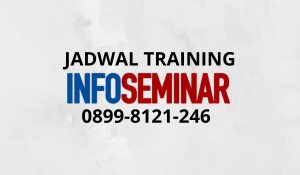Activity Based Costing (JAKARTA)
Jakarta, 3 – 4 Januari 2019
Jakarta, 6 – 7 Februari 2019
Jakarta, 5 – 6 Maret 2019
Jakarta, 1 – 2 April 2019
Jakarta, 2 – 3 Mei 2019
Jakarta, 3 – 4 Juni 2019
Jakarta, 1 – 2 Juli 2019
Jakarta, 1 – 2 Agustus 2019
Jakarta, 2 – 3 September 2019
Jakarta, 3 – 4 Oktober 2019
Jakarta, 4 – 5 November 2019
Jakarta, 2 – 3 Desember 2019
Investasi : Rp.3.500.000,- (Termasuk Souvenir, Materi hand-out dan CD modul, 2x Coffee break, Makan siang dan Sertifikat)
Tempat : Fave Hotel LTC Glodok/ Fave Hotel Zainul Arifin/ Fave Hotel Gatot Subroto
TRAINING DESCRIPTION
ABC may be used in common parlance to indicate a degree of simplicity, but as an acronym for Activity – Based Costing, it introduces some of the most revolutionary and fundamental changes in management accounting theory and practice.
What originally appeared to be simply a new method of tracing costs to products has led to the development of an entirely new philosophy referred to as Activity – Based Costing and Management (ABC & M). In this text a holistic approach is proposed to fundamental issues such as the management of cost, time, quality, funds and constraints through the use of ABC & M. ABC & M is therefore not just a new way of computing business figures but requires the fundamental understanding of all management issues. It is about understanding and not about calculations.
- Shortcomings of traditional cost accounting
- Introduction
- Historical development of cost accounting : A synopsis
- Changes in the business environment since 1940
- Traditional cost systems in the modern environment
- Relevance lost
- Conclusion
- Sources consulted
- Conceptual frame work of an activity – based costing and management system
- Introductio
- Activities
- Resources of cost elements
- Performance measures
- Cost drivers
- Output measures
- Cost objectives
- Bill of activities
- Illustrative frame of an activity – based costing and management system
- Continuous improvement
- Process value analysis and process re-engineering
- Activity investment analysis
- Cost of capital management
- Life – cycle accounting
- Conclusion
- Sources consulted
- Costing methodology for raw materials, products and services
- Introductions
- Methodology
- Nature of costs
- Two – stage allocation process
- Wastage
- Determining the cost of raw materials
- Determining the cost of manufactured products
- Conclusion
- Customer and market profitability
- Strategy shifts
- Customer satisfaction
- Customer and market focus
- Customer as cost object
- Micro – cost structure
- Customer and product analysis
- Tracing of costs to customers
- Profit contribution by customer
- Market profitability
- Conclusions
- Sources consulted
- Income measurement
- Introduction
- Part 1 : The value chain approach
- Phases in the accounting cycle
- Explanation of the model
- Part 2 : Features of an activity – based management system
- Strategic support
- Time based accounting
- Residual income
- Processes
- Life – cycle costing
- Cost drivers and output measures
- Wastage and quality management
- Productivity management
- Capacity management
- Multiple cost focus
- Part 3 : Proposed methodology
- Activity – based management approach
- Conclusion
- Process and activity analysis
- Value of process and activity analysis
- Identifying processes and activities
- Processes and activity analysis methodology
- Process re-engineering
- Conclusion
- Sources consulted
- Cost drivers and output measure analysis
- Introduction
- Cost behaviour
- Two – stage cost drivers
- Process drivers
- Output measures
- Focus on output
- Number of output measures (and activities)
- Identification of output measures
- Simple linear regression
- Multiple linear regression
- Validation of output measures
- Conclusion
- Sources consulted
- Cost management
- Introduction
- Strategies analysis
- Processes and activity analysis
- Continuous cost improvement
- Performance evaluation
- Capacity management
- Quality management
- Productivity management
- Process and cycle time
- Conclusion
- Sources consulted
- Activity – based budgeting
- Introduction
- Steps in the ABB process
- Differences between ABB and conventional budgeting
- Controlling through activities
- Conclusion
- Sources consulted
- Performance measurement
- Effectual measures
- Role of activity – based management within a performance measurement system
- The design of a performance measurement system
- Goals and objectives in respect of performance measures
- Characteristics of performance measures
- The balance scorecard
- Conclusion
- Sources consulted
- Implementation
- Introduction
- Step to implement ABC & M
- Systems design and computerisation issues
- Stand – alone or integrated system
- Level of confidence in costs
- Applicability of activity – based cost and management systems
- Links with other management systems
- Conclusion
- Sources consulted
- Strategy support
- Interactive relationship
- Beneficial characteristics of ABC & M
- Strategic applications
- Conclusion
- Sources consulted
Trainer
Profile pembicara dan pengalaman mengajar akan kami sertakan dalam undangan training









